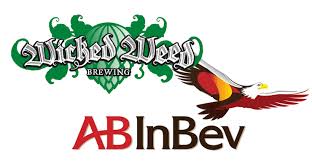 This is not an anti-corporate beer rant. Really.
This is not an anti-corporate beer rant. Really.
Regular readers know that I am no fan of the big corporate breweries. I don’t like their dishonest marketing. I don’t like their predatory sales practices. I don’t like that they are huge multinational behemoths profiting off the desire of beer drinkers to have a refreshing pint at home or their local pub.
But I have been watching the reactions to the latest AB-Inbev buy-out of a respected craft brewer – in this case Wicked Weed, the wild ale specialist out of North Carolina. Most of the reaction has been high volume negative. But there was also this interesting piece from an industry insider that defended the effects of a corporate buy-out. I can only assume the timing was intentional.
The reason this post is not a rant is that I take what the anonymous source says seriously.
My main response, and what is driving me to write this post, is that Mr. Anonymous misses the point. He makes a good case for how the new corporate overlord actually wants their new property to keep making good beer. I believe they invest capital into improving the brewery. I also believe that they instill a decent corporate culture. I am less convinced that they, over the longer term, continue to be hands off on the beer itself, but that thought is unproven.
But here is the thing. None of that is the point. Mr. Anonymous is chasing the wrong rabbit.
I truly believe the big boys are capable of allowing good craft beer to come out 0f one of their breweries. They do like good beer and know one when they see it. And they might even like the margins craft beer gives them in comparison to Lucky or Wildcat.
But, ultimately, they miss what is the core of craft beer. Yes, it is about interesting flavours, and the big boys, at least theoretically, can do that. But it is more than that. It is about integrity. It is about being honest about where your beer comes from and what it is about.
And that is where they fall short. For two reasons. First, they can’t help themselves but to mislead consumers – it is in their DNA. I mean, these are the people who try to tell you if you drink their brand you will be surrounded by buxom-y bikini-clad women! They hide their ownership of craft breweries, hoping consumers don’t notice. They over-hype their regular brands to a degree that is almost ridiculous. They create pseudo-craft brands (such as Shock Top, Blue Moon, Rickards and so on) to try to lure beer drinkers away from real craft. Misleading is a central aspect of their existence, and that cannot be ignored.
Second, they try to pretend that ownership doesn’t matter. And maybe most beer drinkers, well acclimatized to drinking corporate beer, don’t care. But, like it or not, ownership matters in craft beer. I am not saying a brewery has to be owned by three broke bearded hipsters just trying to survive. Capital is a good thing when operating a brewery. But there is a big difference between some local investors – even if they have a lot of money – and the biggest beer corporation in the world. Connection matters. Local entrepreneurs have some buy-in to their local community. Even if a craft brewery grows big, it still has a sense of where it came from.
 The big boys don’t have that. They have lost geography. They don’t care when, where or how their beer is sold, just as as long as it is. I appreciate Mr. Anonymous for saying that life goes on when a craft brewery sells to one of the big guys, but what he doesn’t get is that his new owner doesn’t care about Asheville, North Carolina, or any other city. Just as long as the beer sells.
The big boys don’t have that. They have lost geography. They don’t care when, where or how their beer is sold, just as as long as it is. I appreciate Mr. Anonymous for saying that life goes on when a craft brewery sells to one of the big guys, but what he doesn’t get is that his new owner doesn’t care about Asheville, North Carolina, or any other city. Just as long as the beer sells.
Local craft brewers are not perfect. Nor are they angels. Many have a less than desired connection to their home town. Others are just in it for the money. But from my more than a decade of dealing with craft breweries, I can confidently say that is the minority. Most craft brewery owners are deeply committed to their community and want to be a part of something at the local level.
Even when they get big, they still try to engage their local roots.
The big boys can’t do that because they lost their local decades ago. AB-Inbev has no home. Neither do any of the others.
That is why the sale of a successful craft brewer to one of the corporate brewers is a problem. It is not that they are big. It is not that they are anti-craft. It is that they have lost their capacity to understand local. They are okay allowing good beer to be made, but they can’t understand how the connection to local community actually matters as much as quality (to a certain degree).
And that is why corporate buy-outs are a bad thing. It is not that it is a “sell out” or the “end” of a great brewer. It is the loss of local that matters. There will still be good beer. It just won’t be local beer.

May 10, 2017 at 10:13 AM
Great read Jason. I do agree and if you added in unfair advantage in marketing and buying power – this would have been my response a few days ago too. That was, until I read The Magic of Megabrew. Sorry if links are not allowed, but this was the best insight into the reasons macros are buying and written by a real, identified insider. It’s a very long read and very detailed. The short version is that Bud Light was considered premium and priced up with most other premium beers when it launched. Since it’s launch, craft has moved in and the price for Bud Light is lower than craft quite often. So, Bud Light isn’t really viewed as premium. There may have to be write downs in the value of the company in the billions of dollars (it’s too complicated for me to paraphrase). ABI goes and buys craft breweries, puts them on tap everywhere, lowers the price. So now you can get a pint of Elysian or whatever for the same price as Bud Light in some places. Bud Light remains premium, they do not have to devalue their brand. Now that these so called craft brands that ABI owns sets a lower price, now independents are pressured to lower their price, which they can’t really afford to do. The craft brewers start going out of business. This is the real goal of the macros – Self-Preservation and Craft Brewery Extinction. Independent ownership is, in my opinion, the most important element. Without out it, we’ll be back to 20 breweries again in a couple of decades.
May 10, 2017 at 12:38 PM
You’ve hit the nail on the head Jason. Craft beer is local beer, made by your neighbours, contributing to your local economy. Once the local brewery is acquired in a corporate buyout the geographical location becomes just another cost/benefit factor to be calculated on the corporate spreadsheet. Wikipedia says that the Granville Island Brewery site is now just used to develop and produce small batch beers and the actual brewing is being done at Molson Coors’ Burrard Inlet brewery. That prime piece or real estate sold in 2015 (for $185 million) according to a CBC article and Molson Coors is going to be building a new brewery in Chilliwack beginning this year. CBC reports their new automated brewery will employ 100 staff… total. Meanwhile, in the same article CBC says the local craft industry in BC has created more than 2,500 jobs in 60 communities over the past decade. We should all do the math, the megabrewers do.